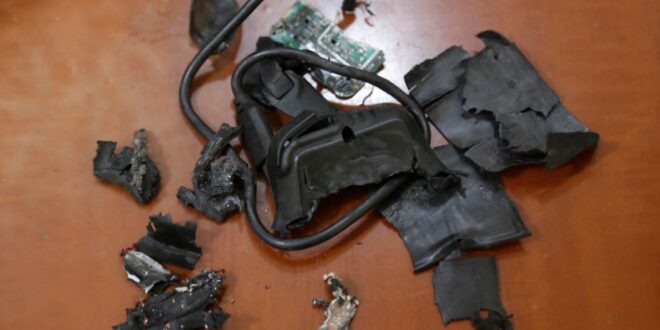Israel has targeted Hezbollah members with pagers rigged with explosives. The New Arab looks into whether this violated international law?
Israel’s attack against Hezbollah on Tuesday, which saw thousands of rigged pagers explode, resulting in at least 11 deaths and around 4,000 wounded, has seen international condemnation.
Included in these condemnations were reminders on the importance of international humanitarian law and warnings that the attack could have violated international humanitarian law.
The UN’s Special Coordinator for Lebanon, Jeanine Hennis-Plasschaert, condemned the attack, with a statement from her office saying: “in accordance with international humanitarian law, she reminds all concerned actors that civilians are not a target and must be protected at all times.”
UN High Commissioner for Human Rights, Volker Turk, also added to those sentiments, calling for an independent investigation.
“Simultaneous targeting of thousands of individuals, whether civilians or members of armed groups, without knowledge as to who was in possession of the targeted devices, their location and their surroundings at the time of the attack, violates international human rights law and, to the extent applicable, international humanitarian law.”
Human Rights Watch Middle East and North Africa Director, Lama Fakih, also condemned the attack, calling for an impartial investigation and warning that international law’s prohibition of booby traps is to protect civilians.
However, what aspect of international humanitarian law could this attack violate? The New Arab takes a look.
Violations against International Law
Brian Finucane, a senior advisor for International Crisis Group and former legal adviser at the US state department, told The New Arab that the attack “raises questions under amended protocol two of the convention of certain conventional weapons, which regulates booby traps.”
Although not prohibiting outright the use of boobytraps, certain conditions are placed on signatories, which includes Israel, Lebanon and the US.
“For example, it prohibits the use of booby-traps in the form of apparently harmless portable objects which are specifically designed and constructed to contain explosive material.” Such restriction falls under point two of article seven of the amendment.
“We’re still waiting to get more information about how exactly these pagers were modified, and that might be relevant to this prohibition,” he added, saying that without more information it was hard to reach definitive conclusions on what violations have occurred.
Senior Lecturer at Kings College London Dr Andreas Krieg told The New Arab that the attacks could violate article 51(3) and 48 of Protocol One of the Geneva Convention.
Where Article 51(3) pertains to civilians being afforded protection if they don’t take part in hostilities, Article 48 ensures that parties to conflicts should distinguish between civilians and combatants, as well as civilian objects and military objectives.
“Any weapon you choose should adequately distinguish between a combatant and civilian, and the weapon as such was basically unable to adequately distinguish between a combatant and civilian.”
Kreig also noted that the attack could violate article of 41 of Protocol One of the Geneva Convention on the prohibition of attacks against Hors de Combat, defined as a person in the power of the adversary, or who wishes to surrender, or is incapacitated and cannot defend themselves, and whether said persons attacked were in fact combatants.
“The excess and the disproportionality of violence against targets is due to the fact that Israel has a different metric when it comes to measuring who is a combatant and who isn’t and that is problematic,” he added.
“We should problematize this attack yesterday because if it’s normalized, it set the precedent, and if no one in the international community is condemning it, then this might be a sort of attack that we could see being played out time and again.”
 Eurasia Press & News
Eurasia Press & News




